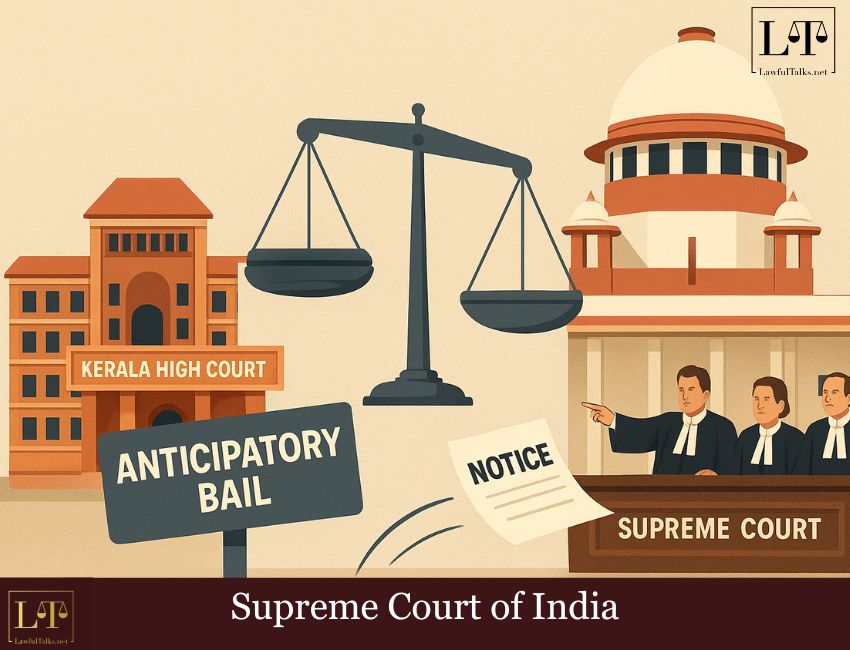Allahabad HC Sets Aside Afzal Ansari's Conviction, Allows Him to Continue as MP

The Supreme Court of India has expressed its disapproval of the growing practice of High Courts directly entertaining applications for anticipatory bail without the applicant first approaching the Sessions Court. The Court has decided to consider the appropriateness of this practice and has issued notice to the Kerala High Court in a matter where such a direct filing was allowed. The issue has triggered a larger debate on whether anticipatory bail applications should first be filtered at the Sessions court level before reaching the High Courts.

Background :
The matter arose when the petitioners approached the Kerala High Court directly, seeking anticipatory bail, without first moving the Sessions Court. The Supreme Court, while hearing the appeal, noted that such a practice, if encouraged, would burden the High Courts unnecessarily and undermine the procedural balance provided under the law. In this context, the bench appointed Senior Advocate Sidharth Luthra, assisted by Advocate G. Arudhra Rao, as amicus curiae to assist the Court.
The bench comprising Justice Vikram Nath and Justice Sandeep Mehta acknowledged that the Bharatiya Nagarik Suraksha Sanhita conferred concurrent jurisdiction to both the Sessions Court and the High Court to deal with an anticipatory bail application. However, the judges were of the opinion that the High Court can directly entertain such matters only in exceptional cases, that too for special reasons to be recorded.
The Court observed:"if the practice of entertaining the applications for pre-arrest bail directly in the High Court is encouraged, and the parties concerned are not relegated to first approach the Sessions Court concerned, the High Court would be flooded with a spate of pre-arrest bail applications thereby creating a chaotic situation."
It further noted that Sessions Judges are better equipped to assess such matters: "The Sessions Judge exercises powers under Section 438 CrPC in relation to all cases registered with the police stations in the particular District. This area-wise distribution of work would make it much more convenient and facilitate expeditious disposal, if the application for pre-arrest bail is first filed before the Sessions Court which would have a direct and first-hand assistance of the concerned Public Prosecutor appointed for that particular District. The Sessions Court would also have an immediate access to the Case Diary thereby facilitating a better appreciation of facts of the case."
The bench also highlighted that in many High Courts, the settled practice requires litigants to first approach the Sessions Court, with limited exceptions: "only in the event of denial of such relief (by the Sessions Court), the litigant would be granted access to approach the High Court for seeking such relief. This is, of course, subject to just exceptions and the High Court, for reasons to be recorded, may entertain an application for pre-arrest bail directly in special/extra-ordinary circumstances."
The present ruling comes amid conflicting positions taken in earlier cases. In Manjeet Singh v. State of Uttar Pradesh SLP (Crl) 11667/2025, decided on August 7, 2025, a bench led by Justice Sanjay Kumar held that:"This Court's decisions in “Kanumuri Raghurama Krishnam Raju Vs. State of A.P” (2021) 13 SCC 822 and “Arvind Kejriwal vs. Directorate of Enforcement” 2024 INSC 512 made this position clear and declared that it would not be necessary for an accused to approach the Sessions Court in the first instance, as a rule, before approaching the High Court."
Similarly, in Gauhati High Court Bar Association v. State of Assam & Ors (2023), the Court considered whether High Courts can decline jurisdiction on the ground that the Sessions Court was not first approached.
Earlier precedents, such as Balan v. State of Kerala (Kerala HC, 2003) and the 2020 decision of a five-judge bench of the Allahabad High Court, had also clarified that Section 438 CrPC does not mandate a first approach to the Sessions Court, though direct access to the High Court may be allowed only under special circumstances.
Case Title: MOHAMMED RASAL.C & ANR. VERSUS STATE OF KERALA & ANR., SLP (Crl.) No. 6588/2025

Pallavi Zende
Law Student
Latest Posts
Categories
- International News 19 Posts
- Supreme Court 352 Posts
- High Courts 367 Posts





























































































































































































































































































































































































































































































































































































































































































































































